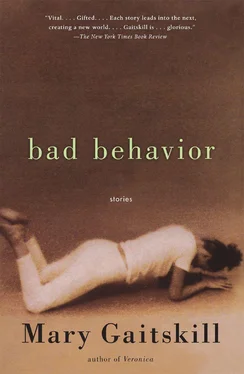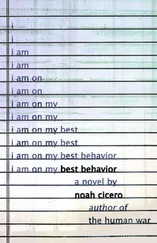“You have a way, you know, of shoving your vulnerability right into people’s faces. Or something that you call vulnerability, anyway. You sometimes do it immediately upon meeting them. You force people to deal with it.” Deana was speaking excitedly but precisely, her words like clean-cut vanilla-colored chips.
“Deana.”
“No, listen to me. Don’t be angry with me for saying this; you don’t do it as much as you did. But you used to do it a lot, and it’s kind of strange to be confronted so aggressively with somebody else’s frailty. Some people will want to protect you, as I did, but some people will want to hurt you. Others will be merely afraid of you, for the obvious reason that it reminds them of their own frailty, which sounds a lot like your friend Alice.”
Connie drew up her legs and sat with her arms around both knees and looked out the window again. It was true that in the summer the air shaft had an oddly poetic aspect. On days when the apartment air was heavy and stifling as a swamp, noises and smells came floating up it on clouds of heat, lyrical blends of voice and radio scraps, drifting arguments and amorous sighs, the fried shadow of someone’s dinner, a faded microcosm that lilted into their apartment and related them to everyone else in the building. Of course, whether or not this relationship was a pleasant sensation depended largely on one’s frame of mind, as well as on other factors; last summer the apartment below them had been sublet to a boy who would drunkenly imitate their voices when they made love.
“Have I upset you?” asked Deana.
“No, no.” Connie looked up. “I understand what you’re saying, but that wasn’t the case with Alice. I never acted vulnerable around her. And actually I don’t really agree with you. I may have done that to you because I responded to you sexually, but in general, I don’t.”
Deana shrugged. “Well, I only know what I’ve seen. I’m just trying to come up with an answer for you because you seem so distressed.” She stood and collected the dishes. Her fingers and hands, Constance thought, had an exposed, strangely cold and receptive quality, like the nose of a puppy. As she was watching her clear the table and take the dishes to the kitchen, she could see the many aspects of her lover come forward and shyly recede with each movement; her rigid, stubborn arms, her strong shoulders positioned in a soft, demure curve, her stern chin, her luminous forehead, her odd way of stiffly holding back and gently, curiously moving forward — all spoke of her radial gradations of tenderness, sorrow and radiant, fanlike intelligence.
She woke up in the middle of the night, slumberously thinking of Franklin. “I love you,” he said. “I love you in a way I’ve never loved anyone.” “I don’t know what you mean,” she said. “He’s just crazed,” said his friends. “Frank’s hyper, that’s all.” What would happen if she went to his party? Would he fall all over her and rave about how glad he was to see her, then disappear for the rest of the night? Would it hurt her feelings? She imagined Alice standing near a table of ravaged snacks, holding a plastic cup of alcohol, a little hat neatly sitting on her blow-dried head. It wasn’t true that Alice had no unhappiness. She had a schizophrenic mother who lived in a state mental hospital (Alice’s family wasn’t wealthy) and who sometimes didn’t know her. Alice felt that she wasn’t accepted as an artist by her circle, and sometimes would get so upset about it that she’d scream and throw things. “I feel like a piece of shit,” she once said to Connie.
Connie turned and put her stomach and breasts against Deana’s warm back. She thought about the first woman she’d had a crush on, a beautiful stripper with black hair and bitter blue eyes. She had gone to see her strip and was irretrievably moved by the resigned but arrogant turn of her strong chin, the way she casually offered and rigidly withheld her body, as well as her tacky black lingerie.
“You don’t love women. You’re just trying to live out some kind of porno fantasy invented by men with the corniest props you can find,” a gay woman had told her.
She turned again and placed her back in a matching curve against Deana’s. When she was a child, her mother had said, “When boys get angry with each other, they just fight it out and it’s all over. But girls are dirty. They pretend to be your friend and go behind your back.” She remembered herself as the new girl in elementary school trying to belong with the bony-legged clusters of little girls snapping their gum and talking about things that she never discovered the significance of. She saw herself sitting alone in a high school cafeteria eating french fries and a Cap’n Crunch bar.
She opened her eyes and could barely see the big-eared outline of the tiny ceramic Siamese cat that her aunt had given her when she was twelve. At the time she had thought that it and its brood of ceramic kittens were the height of taste and elegance, and even though its face had been broken in half and Krazy-glued back together, it still seemed faintly regal and glamorous. It had been one of the items that Alice had in mind when she looked at Connie’s dresser and said, “One of these days you’re going to wake up and look at all this stuff and say, ‘This doesn’t have anything to do with me,’ and throw it out.”
But it does have something to do with me, thought Connie.
The next day she had to leave the office because of a sudden and painful toothache. She thought it might’ve been psychosomatically induced by the memory of the exposed-nerve episode with Alice in the theater, but the dentist assured her that it was not.
“Nope, nope, nope. This is the real thing, all right. You’ve just got a lulu of a mouth, is all. Just one thing after another. But this isn’t a root canal. Just a deep, nasty filling.” He jabbed her tooth with an instrument and she gasped with pain. “I’m surprised that it hasn’t hurt you before. It’s practically into your navel.” He jabbed her again; she groaned and tried to close her mouth. “Don’t worry, though, we caught it in time.” He swiveled robustly in his chair and began to manipulate his precise, needle-nosed implements. Dr. Fangelli had very large forearms heavily strewn with hair; his hands seemed weirdly placed on his wrists, and his unevenly spaced fingers suggested undue activity in impossibly varied directions. He wasn’t a big man, but when he walked his arms and shoulders rolled like a tank tread, and he seemed to suddenly require a lot of space.
“Okay, now, we’re going to inject you with a little—” His face zoomed at her, and she had the disturbing thought that its happy, porous proximity could unhinge her jaw with the projected, exuberant desire that she open wide.
“What about the nitrous?” she asked.
He backed off. “Oh, I forgot, you like that. I keep telling you it kills your brain cells, but if you want it—” He swiveled violently away. “Carla! Carla, get me some nitrous in here, will you?”
Carla, a dark, small-nosed girl with mascara-crusted eyelashes, entered pushing the familiar gray machine, and a cool rubber, none-too-clean mask was placed over Connie’s nose. “There we go,” said Dr. Fangelli. “Crank her up, Carla. We’ll let you get nice and relaxed. Carla, get the cream two-six base.”
Connie closed her eyes. A balloon of warm air slowly expanded in her head. She thought of the commercials for Wonder Bread that she’d seen as a kid, in which a lucky little boy was borne by friendly butterflies to Wonder Bread Land, a place full of flowers and clouds and loaves of bread.
“So, Connie, are you married yet?” asked Dr. Fangelli.
“No.”
“No? I’m surprised. How old are you?”
Читать дальше












